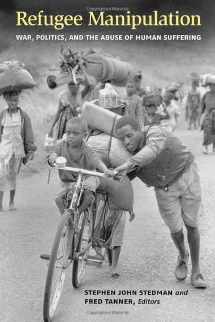
Refugee Manipulation: War, Politics, and the Abuse of Human Suffering
ISBN-13:
9780815780908
ISBN-10:
0815780907
Author:
Stephen John Stedman, Fred Tanner
Publication date:
2003
Publisher:
Brookings Institution Press
Format:
Hardcover
202 pages
FREE US shipping
Book details
ISBN-13:
9780815780908
ISBN-10:
0815780907
Author:
Stephen John Stedman, Fred Tanner
Publication date:
2003
Publisher:
Brookings Institution Press
Format:
Hardcover
202 pages
Summary
Refugee Manipulation: War, Politics, and the Abuse of Human Suffering (ISBN-13: 9780815780908 and ISBN-10: 0815780907), written by authors
Stephen John Stedman, Fred Tanner, was published by Brookings Institution Press in 2003.
With an overall rating of 4.3 stars, it's a notable title among other
books. You can easily purchase or rent Refugee Manipulation: War, Politics, and the Abuse of Human Suffering (Hardcover) from BooksRun,
along with many other new and used
books
and textbooks.
And, if you're looking to sell your copy, our current buyback offer is $0.3.
Description
Since World War II, refugee organizations have faced a recurrent challenge: the manipulation of refugees by warring parties to further their own aims. Some armies in civil wars, facing military defeat, use refugees as assets to establish the international legitimacy of their cause, treat refugee camps as sanctuaries and recruitment pools, and limit access to refugees to ensure that they will not repatriate. Focusing on the geopolitical security environment surrounding militarized camps and the response of humanitarian agencies, the contributors to this volume examine the ways armed groups manipulate refugees and how and why international actors assist their manipulation. They then offer suggestions for reducing the ability of such groups to use the suffering of refugees to their own advantage. The contributors examine three cases: Cambodian refugees along the Thai border in the 1970s and 1980s, Afghan refugees in Pakistan in the 1980s and 1990s, and Rwandan refugees in Eastern Zaire from 1994–96. They argue that refugee manipulation occurs because warring parties gain resources in their fight for power and other actors, often the host government and regional and major powers encourage and support it. Manipulation is allowed to occur because the international refugee regime and major states have not identified a consistent approach to stopping it. In the post-Cold War era the United Nations and its members have chosen to treat the issue as a humanitarian problem instead of a security problem. As the contributors make clear, however, manipulation of refugees has important ramifications for international security, turning some civil wars into larger protracted regional wars. They argue that the geopolitics of refugee manipulation leads to sanguine conclusions about stopping it. Solutions must change the moral, political, and strategic calculations of states that are implicated in the manipulation. As long as the problem is not deemed a security threat, refugee organizations must choose between assistance that prolongs war or walking away from millions who deserve help. Contributors include Howard Adelman (York University), Frederic Grare (Centre des Sciences Humaines, New Delhi), Margaret McGuinness (Paul, Weiss, Rifkind, Wharton, and Garrison), Stephen John Stedman (Stanford University), Fred Tanner (Geneva Centre for Security Policy), and Daniel Unger (Northern Illinois University).


We would LOVE it if you could help us and other readers by reviewing the book
Book review

Congratulations! We have received your book review.
{user}
{createdAt}
by {truncated_author}


